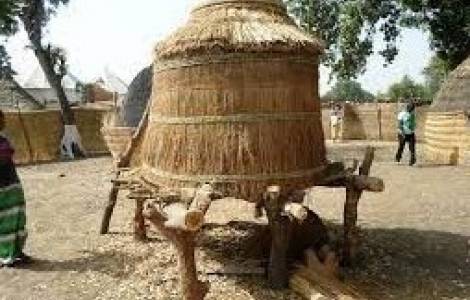
Madian
Yagoua (Agenzia Fides) - An emergency stock of about 30 tons of cereals is the new project supported by Madian Orizzonti, the non-profit organization of the Camillian religious of Turin, in support of the activities of the Bishop of the Diocese of Yagoua, Msgr. Barthélemy Yaouda. According to what is highlighted in the note sent to Fides, the project aims to give a concrete response in food support to about 150 poor and vulnerable families in the village communities of the Diocese of Yagoua in Cameroon. The stock will be deposited in the warehouse of the Diocese of Yagoua and will be monitored to protect the cereals from insects and rodents so that in the height of the famine season, support can be provided to identified families. In fact, the Diocese already has a grain storage warehouse with a capacity of about 100 tons, which can serve as a community granary. The distribution will consist in giving each family a quantity of about 200 kilograms of cereals to allow them to guarantee a daily meal during the drought period which promises to be quite long given the low rainfall. According to the data collected, it is estimated that about 6.2 million people are in need of food aid, 52% of whom are women. This situation increases the vulnerability of populations and in particular of children under 5 years of age; the prevailing level of food insecurity in the far north region in general, and in the diocese of Yagoua in particular, remains worrying because it is marked by the persistence of atavistic malnutrition.
The diocese extends over three of the six departments of the far north region of the country, in particular the departments of Mayo-Danay, Mayo-Kani and Logone and Chari. It is made up of about 33 parishes and 2 missions, the territory of intervention of the Diocese of Yagoua covers an area of about 22,461 m² and has about 1,500,000 inhabitants.
The climate is Sudanese-Sahelian with a long dry season of about nine months from October to June and a rainy season from July to September. There are several ethnic groups: the Massa, the Moussey; the Mousgoum and Toupouri in the Mayo-Danay department; the Moundang and Guiziga in Mayo-Kani; the Kotoko and the Arabs in Logone and Chari.
Populations that live mainly from agriculture, livestock and fishing and communities are facing, in addition to the crisis of famine, the damage caused by elephants which every year destroy hundreds of hectares of cereal fields in their passage. (AM/AP) (Agenzia Fides, 15/7/2022)